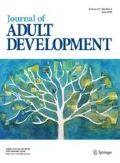Abstract
Part I (in this issue)—A Dialectical-Constructivist View of Human Development, Psychotherapy, and the Dynamics of Meaning-Making Conflict Within Therapeutic Relationships— reviews a dialectical-constructivist model of human development and articulates, in the language of that model, how psychotherapy, in general, works. It describes and illustrates three generic processes, which contribute to the frequent successes of an extremely diverse range of psychotherapy theories and practices. This view of psychotherapy focuses on both the client's meaning-making processes and the therapist's meaning-making processes and how they contribute together to effective psychotherapy. Part I also offers a way of understanding what is going on when therapeutic progress is blocked by conflict between the client's and the therapist's meaning-making processes. Part II—Dialectical Thinking and Psychotherapeutic Expertise: Implications for Training Psychotherapists and Protecting Clients from Theoretical Abuse—explores those experiences in which the therapist's own exercise of his or her meaning-making structures, and maintenance of the integrity of his or her theories, has a limiting or destructive impact on the value of therapy to the client. It considers the concept of “theoretical abuse” by psychotherapists as a way of characterizing the most destructive of these experiences. This serves as a rhetorical device for introducing comparisons between these phenomena and the phenomena of sexual abuse by psychotherapists, in terms of dynamics, prevalence, and appropriate strategies for prevention. Part II uses work on the development of dialectical thinking in adulthood to conceptualize how different understandings of the nature of psychotherapists' expertise increase or decrease the likelihood and severity of “theoretical abuse”. Finally, it derives implications for training psychologists and other psychotherapy professionals.
Similar content being viewed by others
References
American Psychologist. (1996). Special issue: Outcome assessment of psychotherapy.51(10).
Basseches, M. (1978).Beyond closed-system problem-solving: A study of meta-systematic aspects of mature throught. (Unpublished doctoral dissertation, Harvard University.) Ann Arbor, MI: University Microfilms No. 7918210.
Basseches, M. (1984).Dialectical thinking and adult development. Norwood, NJ: Ablex.
Basseches, M. (1989a). Toward a constructive-developmental understanding of the dialectics of individuality and irrationality. In D. A. Kramer & M. J. Bopp (Eds.),Transformation in clinical and developmental Psychology (pp. 188–209). New York: Springer-Verlag
Basseches, M. (1989b). Intellectual development: The development of dialectical thinking. In E. P. Maimon, B. F. Nodine, & F. W. O'Connor (Eds.),Thinking, reasoning and writing (pp. 23–45). White Plains, NY: Longman.
Consumer Reports. (1995, November). Mental health: Does therapy help? pp. 734–739.
Dawes, R. M. (1994).House of cards: Psychology and psychotherapy built on myth. New York: The Free Press.
Dorpat, T. L. (1996).Gaslighting, the double whammy, interrogation, and other methods of covert control in psychotherapy and analysis. New York: Joson Aronson.
Greenberg, L., & Pascual-Leone, J. (1995). A dialectical-constructivist approach to experiential change. In R. A. Neimeyer, & M. J. Mahoney (Eds.),Constructivism in psychotherapy. (pp. 169–194). Washington, DC: American Psychological Association.
Greenberg, L. S., Rice, L. N., & Elliot, R. (1993).Facilitating emotional change: The moment by moment process. New York: Guilford Press.
Habermas, J. (1971).Knowledge and human interests. Boston, MA: Beacon Press.
Herman, J. L. (1992).Trauma and recovery. New York: Basic Books.
Inhelder, B., & Piaget, J. (1958). The growth of logical thinking from childhood to adolescence. New York: Basic Books.
Kegan, R. G. (1982).The evolving self: Problem and process in human development. Cambridge, MA: Harvard University Press.
Kohlberg, L. (1969). Stage and sequence: The cognitive-developmental approach to socialization. In R. A. Goslin (Ed.),Handbook of socialization theory and research. New York: Rand McNally.
Lipson, A. (1993).Critical incidents in psychotherapy. Unpublished manuscript, Harvard University.
Neimeyer, R. A. (1995). Constructivist psychotherapies: Features, foundations and future directions In R. A. Neimeyer & M. J. Mahoney (Eds.),Constructivism in psychotherapy (pp 11–38). Washington, DC: American Psychological Association.
Pascual-Leone, J. (1990). Emotions, development and psychotherapy: A dialectical-constructivist perspective. In J. Safran & L. Greenberg (Eds.),Emotion, psychotherapy and change (pp.302–335). New York: Guilford Press.
Piaget, J. (1952).The origins of intelligence in children. New York: Norton.
Piaget, J. (1962).The moral judgement of the child. New York: Collier. (Original work published 1932)
Piaget, J. (1967).Six psychological studies. New York: Random House.
Rogers, C. R. (1951).Client-centered therapy. Boston: Houghton-Mifflin.
Rogers, C. R. (1959). A theory of therapy, personality and intepersonal relationships as developed in the client-centered framework. In S. Koch (Ed.),Psychology: The study of a science (Vol. 3, pp. 184–256), New York: McGraw-Hill.
Vygosky, L. S. (1962)Thought and language, Cambridge, MA: MIT Press.
Author information
Authors and Affiliations
Rights and permissions
About this article
Cite this article
Basseches, M. A developmental perspective on psychotherapy process, psychotherapists' expertise, and “Meaning-Making Conflict” within therapeutic relationships: A two-part series. J Adult Dev 4, 17–33 (1997). https://doi.org/10.1007/BF02511846
Issue Date:
DOI: https://doi.org/10.1007/BF02511846




